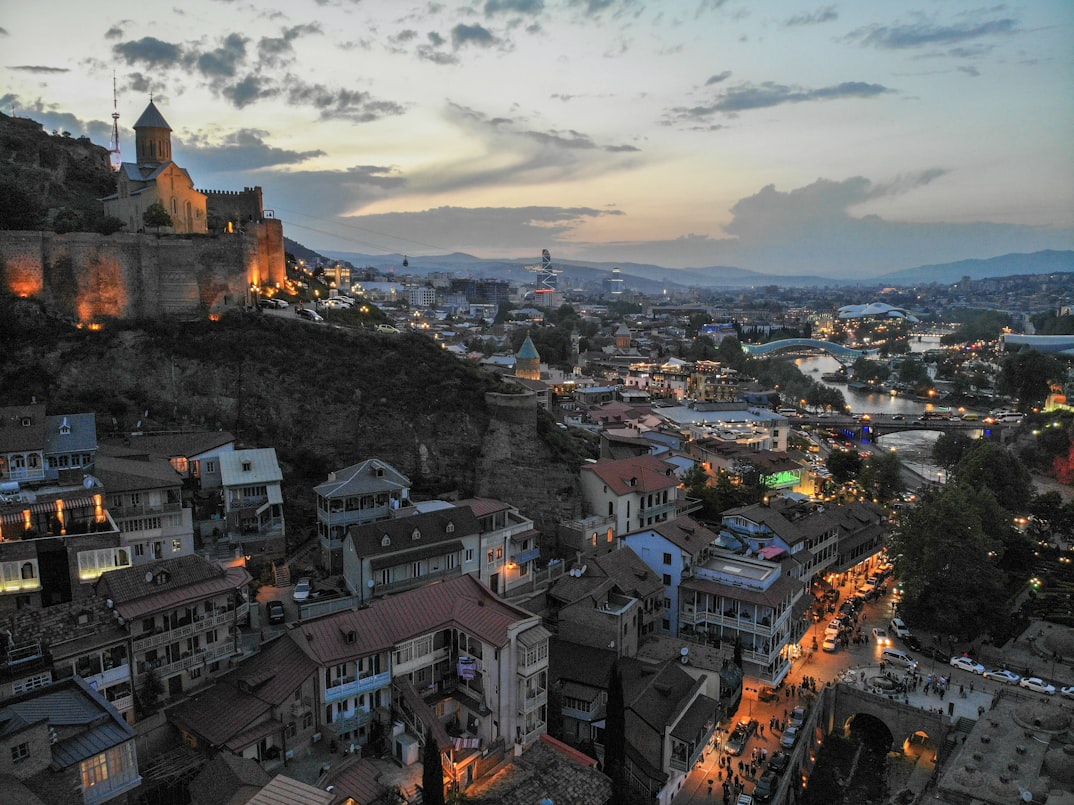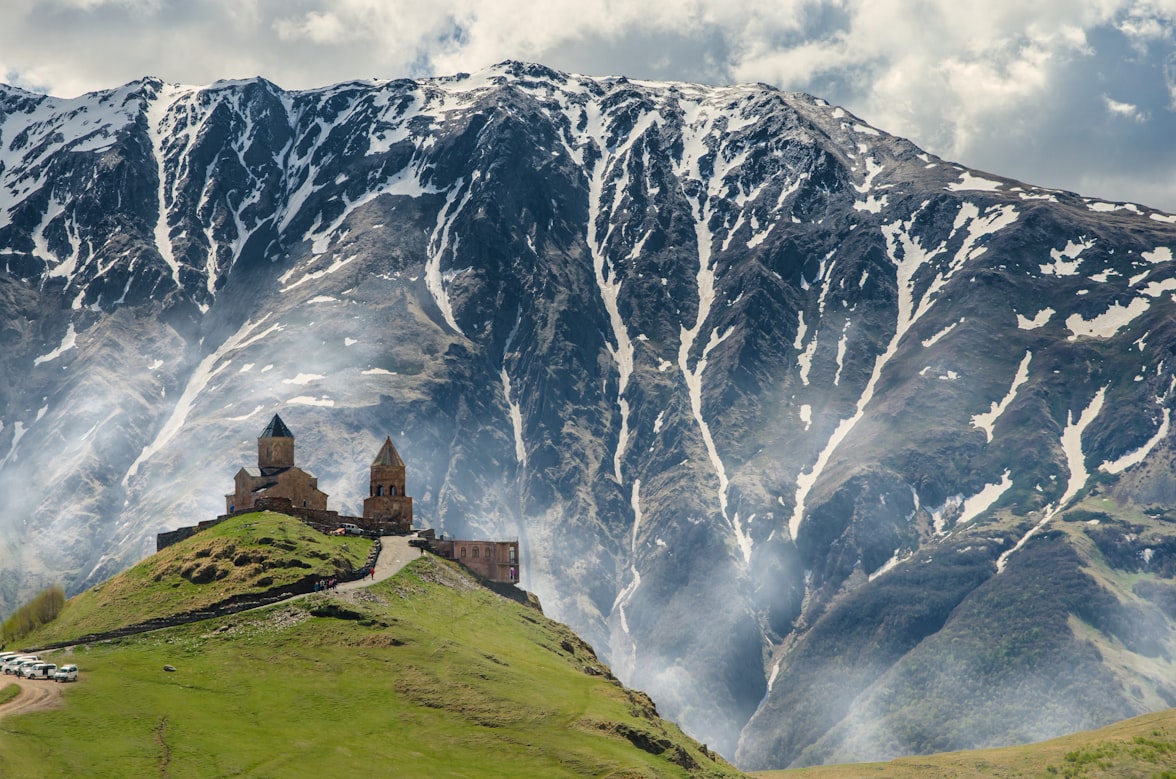Top Attractions
Georgia is a stunning country packed with natural beauty, ancient history, and vibrant culture. One of the must-visit places is Tbilisi, the capital city, known for its eclectic architecture, lively arts scene, and the sulfur baths of Abanotubani. The cave city of Uplistsikhe, carved into rock centuries ago, offers a glimpse into Georgia's past and incredible views over the Mtkvari River. The town of Mtskheta, a UNESCO World Heritage Site, is home to the magnificent Svetitskhoveli Cathedral. For nature lovers, the Kazbegi region (Stepantsminda) offers breathtaking mountain scenery and the iconic Gergeti Trinity Church perched on a hilltop. Don’t miss the wine region of Kakheti, where picturesque vineyards and traditional winemaking techniques await.
Local Dishes
Georgian cuisine is hearty, flavorful, and distinctly unique. A national favorite is khachapuri, a cheesy bread often shaped like a boat and topped with a runny egg and butter. Khinkali, large dumplings filled with spiced meat or mushrooms, are another staple, especially in the mountain regions. Lobio, a rich red bean stew often served with cornbread, and badrijani nigvzit, eggplant slices rolled with a walnut-garlic paste, are popular vegetarian options. Meals are often accompanied by a variety of pickled vegetables, cheeses, and fresh herbs, and no feast is complete without a glass of local wine.
Transportation Tips
Georgia’s transportation system is functional and affordable, although sometimes a bit chaotic. Marshrutkas (minibuses) are the most common way to travel between cities and towns; they’re inexpensive but can be cramped. Trains are available on major routes like Tbilisi to Batumi, offering a more comfortable alternative. Within cities, taxis are plentiful and affordable, though it’s best to agree on a fare in advance or use a ride-hailing app like Bolt. Tbilisi also has a metro system that’s fast and easy to navigate. Roads in the mountains can be rough, so if renting a car, consider a 4WD and be prepared for winding, narrow roads.
Budget Travel Tips
Georgia is very budget-friendly for travelers. Hostels and guesthouses are plentiful and often include breakfast. Local food is inexpensive and delicious, especially from markets or small family-run restaurants. Public transportation is very affordable, and many attractions, like monasteries and nature trails, are free to visit. Wine tastings in Kakheti can be quite affordable if you visit small family wineries. To save even more, consider visiting outside of peak tourist months and use the marshrutka system for intercity travel.
Safety Info
Georgia is generally a safe country for travelers, with low levels of violent crime. Petty theft is rare but can happen in crowded areas, so keep an eye on your belongings. Roads can be dangerous, especially in rural or mountainous areas, due to poor conditions and aggressive driving. It’s advised to avoid the breakaway regions of Abkhazia and South Ossetia, as these areas are politically unstable and not controlled by the Georgian government. Emergency services can be slow in remote areas, so travel insurance is recommended.
Cultural Etiquette
Georgians are known for their hospitality, and guests are often treated with great warmth. It is customary to bring a small gift when visiting someone’s home. During meals, especially at a supra (traditional feast), the tamada (toastmaster) leads toasts, and it’s respectful to listen and participate. Dress modestly when visiting churches and monasteries—women may be expected to cover their heads and wear long skirts. Avoid political discussions, especially regarding disputed regions. Respect for elders is important, and a firm handshake is a common greeting.
Travel Style Fit
Georgia is ideal for cultural explorers, food and wine lovers, and nature enthusiasts. Backpackers and budget travelers will appreciate the affordability and the warmth of guesthouse stays. Adventure travelers will enjoy mountain trekking, ski resorts, and off-the-beaten-path experiences. Couples and digital nomads will find charming cities like Tbilisi perfect for both romance and productivity, especially with its growing co-working scene and café culture.

Best Time to Visit
The best time to visit Georgia depends on your interests. For general sightseeing and pleasant weather, late spring (May–June) and early autumn (September–October) are ideal. These months offer mild temperatures, blooming landscapes or colorful foliage, and harvest festivals in wine regions. Summer (July–August) is hot but great for mountain hiking in Svaneti or Kazbegi. Winter (December–February) is cold and snowy, particularly in the mountains, making it a good time for skiing in places like Gudauri.
Accommodation Recommendations
For low-budget travelers, the Fabrika Hostel in Tbilisi offers a fun and creative space with dorms and private rooms, housed in a converted Soviet-era factory. It’s social, centrally located, and surrounded by cafes and shops. Mid-range travelers may enjoy the Hotel Terrace Kutaisi, which offers comfortable rooms, a rooftop terrace, and easy access to the city’s historical sites. For luxury travelers, the Rooms Hotel Kazbegi is a standout, offering upscale mountain lodge vibes with panoramic views of Mount Kazbek, fine dining, and spa services.
Languages Spoken
Georgian is the official language, written in its unique script. Russian is widely understood by older generations, and English is increasingly spoken among the younger population and in the tourism industry. Learning a few basic Georgian phrases like "gamarjoba" (hello) or "madloba" (thank you) can go a long way in showing respect.
Currency
The currency in Georgia is the Georgian Lari (GEL). ATMs are widely available in cities and towns, and most accept international cards. Credit cards are commonly used in urban areas, but cash is still preferred in rural areas and small businesses. Currency exchange services are available at banks and kiosks throughout the country.
Common Traveler Mistakes to Avoid
One common mistake is underestimating travel times between cities—mountain roads can be slow and winding. Visitors also often overlook the weather; mountainous regions can change rapidly, so layers and good footwear are essential. Skipping smaller towns and rural areas is a missed opportunity; they often offer more authentic experiences. Don’t rely solely on credit cards—carry cash, especially outside major cities.
Essential Apps & Tools
Bolt is the most useful ride-hailing app in cities like Tbilisi. Google Translate helps with the Georgian language, and Maps.me or AllTrails are excellent for navigating hikes and rural areas. The Georgian Railways app is helpful for booking train tickets. TripAdvisor and EatOut help locate highly rated restaurants and activities.
Suggested Itinerary Styles
A well-balanced itinerary could start with 2–3 days in Tbilisi to explore the old town, museums, and sulfur baths. Next, spend 2 days in Kazbegi for hiking and mountain scenery. Add a couple of days in Kakheti for wine tasting and countryside charm. End with a stop in Kutaisi or Batumi depending on whether you're seeking culture or a beach retreat. For adventurous travelers, extending the trip into the Svaneti region adds jaw-dropping alpine landscapes and traditional villages.
Fun Facts
Georgia is one of the world’s oldest wine-producing countries, with evidence of winemaking dating back over 8,000 years. The Caucasus Mountains in Georgia are among the most dramatic and scenic in the world. The Georgian language and its alphabet are unique and unrelated to any other language family. Tbilisi’s name derives from the Georgian word “tbili,” meaning warm, a reference to the area’s natural hot springs.
